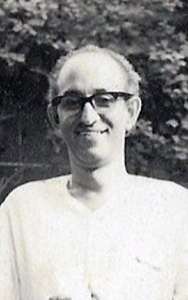Narayan Gangopadhyay
Narayan Gangopadhyay (4 February 1918 – 6 November 1970), also known as Narayan Ganguly, was an Indian novelist, poet, essayist, and short story writer, and one of the leading writers of modern Bengali literature. He introduced the endearing character of Tenida[1] in his famous stories of Children's literature. He took up "Narayan" as his pen name.
Narayan Gangopadhyay | |
|---|---|
 | |
| Native name | Taraknath Gangopadhyay |
| Born | 4 February 1918 Dinajpur, Bengal Province, British India |
| Died | November 6, 1970 (aged 52) Kolkata, India |
| Occupation | Author, Professor, Academician |
| Nationality | Indian |
| Notable awards | Ananda Puraskar (1964) |
| Spouse | Asha Devi |
| Children | Arijit Ganguly |
He was awarded the literary awards Basumati Literary Prize (1968).
Life
Gangopadhyay's hometown was Barisal.[2] His father, Pramathnath, was a police officer. Because his father would be transferred often, he studied in Dinajpur, Faridpur, Barisal and Kolkata. Narayan Gangopadhyay matriculated from Dinajpur Zila School in 1933. He then took admission at Rajendra College in Faridpur but had to leave the town on 1 May 1935 on political grounds. He was interned as a 'revolutionary suspect' and could not appear in the college examinations. Later he took admission in the second year at B M College in Barisal and passed Intermediate Arts (IA) as a non-collegiate candidate in 1936. He passed the Bachelor of Arts with distinction from the same college in 1938. Famous poet Jibanananda Das was his teacher there. In 1941, he completed the MA from the University of Calcutta, receiving the Brahmamayee Gold Medal for his outstanding results. He earned DPhil from the same university in 1960, for his research in the field of short stories in Bengali literature.
Narayan Gangopadhyay taught at a number of colleges, including Ananda Chandra College, Jalpaiguri (1942–45) and the City College, Kolkata (1945-1955). He started teaching at the University of Calcutta in 1956.[3] His students were the famous actor Soumitra Chatterjee and novelist Sunil Gangopadhyay.[4][5]
Works
Narayan Gangopadhyay began writing poetry while still a student. In due course he became famous for his short stories, novels, plays etc. Narayan Gangopadhyay's first story was published in 'Bichitra'. He was a romantic writer. His novels include Upanibesh (3 volumes, 1944-1947), Samrat O Shresthi (1944), Mandramukhar (1945), Shilalipi (1949), Lalmati (1951), Krishnapaksa (1951), Baitalik (1955), and Asidhara (1957). His volumes of short stories include Trophy (1949), Bitangsa, Janmantar, Bhangabandar, Duhshasan, Bhatiyali (1957), Exhibition, Chhayatari, Ghurni, and Aleyar Rat. Among his other works are several volumes of essays: Sahitya O Sahityik, Sahitye Chhotagalpa (1955), Kathakobid Rabindranath (1965), and Chhotagalper Simarekha (1969). He also wrote stories for children, among them, Saptakanda, Andhakarer Agantuk, Chotader Shrestha Galpa (1952), Chhutir Akash, Khushir Hawa, Jhau Banglor Rahasya, Panchananer Hati, Pataldangar Tenida, Galpa Bali Galpa Shona, Abyartha Laksyabhed, Tenidar Abhiyan (1941). Bhadate Chai and Agantuk were two of his widely acclaimed plays. He also wrote a few screenplays and songs for films and gramophone records.
Narayan Gangopadhyay was a regular contributor to Shanibarer Chithi. Towards the end of his life, he used to write regularly for the weekly Desh under the pen name 'Sunanda'. His writings are informed by his historical sense and patriotic feelings as well as his love for the nature of Bengal. His short stories were highly acclaimed, and he was awarded the Ananda Award (1964) in recognition of his contribution to Bengali literature. The weekly Basumati accorded him a reception in 1968. Narayan Gangopadhyay died on 6 November 1970 in Kolkata.
Novels
- Uponibesh-1 (উপনিবেশ -১)
- Uponibesh-2 (উপনিবেশ -২)
- Uponibesh-3 (উপনিবেশ -৩)
- Somrat O Sreshthi (সম্রাট ও শ্রেষ্ঠী)
- Mantramukhar (মন্দ্রামুখর)
- Mohananda (মহানন্দা)
- Swarnaseeta (স্বর্ণসীতা)
- Nishijapon (নিশিযাপন)
- Trophy (ট্রফি)
- Lalmati (লালমাটি)
- Krishnapakkha(কৃষ্ণপক্ষ)
- Bidushok (বিদূষক)
- Boitalik
- Shilalipi (শিলালিপি)
- Oshidhara (অসিধারা)
- Vatiali
- Podoshonchar (পদসঞ্চার)
- Amabossar Gan
- Alokporna (আলোকপর্ণা)
Short Stories
- Golposongroho
- Saper Mathay Moni
- Sreshto Golpo
- Swanirbachito Golpo
Dramas
- Bhim Badh
- Varate Chai
- Agontuk
- Porer Upokar Korio Na (Tenida series)
Satire
- Sunandar Journal
Essays
- Sahitye Chotogolpo
- Bangla Golpo Bichitra
- Chotogolper Shimarekha
- Kothakobid Rabindranath
Juvenile literature
- Charmurti (Filmed as Charmurti in 1978)
- Charmurtir Abhijan
- Abyartha Lokhyobhed Ebong (not a Tenida story)
- Jhaubanglar Rohosyo
- Kombol Niruddesh
- Tenida o Sindhughotok
- Porer Upokar Korio na (Drama)
- Tenida Somogro
- Rammohan
- Samagra Kishore Sahitya
References
- পাগলা দাশু +ঘনাদা = পটলডাঙার সেই মূর্তিমান ?. Ei Samay (in Bengali).
- Anjali Basu; Subodh Chandra Sen Gupta (2010). সংসদ বাঙালি চরিতাভিধান: প্রায় চার সহস্রাধিক জীবনী-সংবলিত আকর গ্রণ্থ [Samsad Bengali Biographical Dictionary: A Repository Containing More Than Four Thousand Biographies] (in Bengali) (First ed.). Sahitya Samsad. p. 352. ISBN 978-81-7955-135-6.
- পড়ানোর অনন্য প্রতিভায় মিশেছিল পরম স্নেহনারায়ণ গঙ্গোপাধ্যায়. Ei-samay (in Bengali).
- "How Much Do You Know About Tenida". roar.media. Retrieved 28 May 2018.
- ২০ নম্বর পটলডাঙা স্ট্রিট [The Lane Which Created History]. Anandabazar Patrika (in Bengali). Retrieved 28 May 2018.